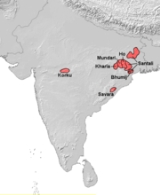
Munda languages
Encyclopedia
Anderson
Gregory AndersonGregory Anderson (linguist)
Gregory David Shelton Anderson is a Director of the Living Tongues Institute for Endangered Languages and a leading specialist in Munda languages. Anderson earned his doctorate in linguistics from the University of Chicago in 2000. He is currently working on the .Anderson has also been featured in...
's 1999 proposal is as follows. Individual languages are highlighted in italics.
- North Munda (2 branches)
- Korku
- Kherwarian
- Santhali
- Mundari
- South Munda (3 branches)
- Kharia–Juang
- Juang
- Kharia
- Sora–Gorum
- Sora
- Gorum
- Gutob–Remo–Gtaʔ
- Gutob–Remo
- Gutob
- Remo
- Gtaʔ
- Plains Gtaʔ
- Hill Gtaʔ
- Gutob–Remo
- Kharia–Juang
However, in 2001, Anderson split Juang and Kharia apart from the Juang-Kharia branch and also excluded Gtaʔ from his former Gutob–Remo–Gtaʔ branch. Thus, his 2001 proposal includes 5 branches for South Munda.
Anderson (2001)
AndersonGregory Anderson (linguist)
Gregory David Shelton Anderson is a Director of the Living Tongues Institute for Endangered Languages and a leading specialist in Munda languages. Anderson earned his doctorate in linguistics from the University of Chicago in 2000. He is currently working on the .Anderson has also been featured in...
(2001) follows Diffloth (1974) apart from rejecting the validity of Koraput. He proposes instead, on the basis of morphological comparisons, that Proto-South Munda split directly into Diffloth's three daughter groups, Kharia–Juang, Sora–Gorum (Savara), and Gutob–Remo–Gtaʼ (Remo).
His South Munda branch contains the following five branches, while the North Munda branch is the same as those of Diffloth (1974) and Anderson (1999).
- Note: "↔" = shares certain innovative isoglosses (structural, lexical). In Austronesian and Papuan linguistics, this has been called a "linkageLinkage (linguistics)In linguistics, a linkage is a group of undoubtedly related languages for which no proto-language can be reconstructed. Malcolm Ross, who coined the term, defined it as “a group of communalects which have arisen by dialect differentiation” ....
" by Malcolm RossMalcolm RossMalcolm David Ross is a linguist and professor at the Australian National University. He has published work on Austronesian and Papuan languages, historical linguistics, and language contact.-External links:**...
.
General references
- Diffloth, Gérard. 1974. "Austro-Asiatic Languages". Encyclopædia Britannica. pp 480–484.
- Diffloth, Gérard. 2005. "The contribution of linguistic palaeontology to the homeland of Austro-Asiatic". In: Sagart, Laurent, Roger Blench and Alicia Sanchez-Mazas (eds.). The Peopling of East Asia: Putting Together Archaeology, Linguistics and Genetics. RoutledgeCurzon. pp 79–82.

